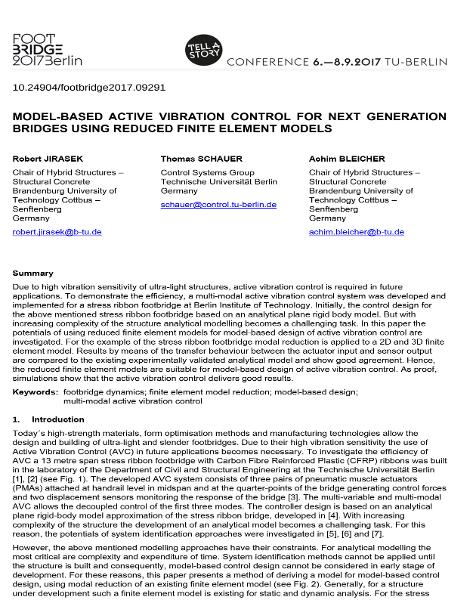Model-Based Active Vibration Control for Next Generation Bridges Using Reduced Finite Element Models

| Auteur(s): |
Robert Jirasek
Thomas Schauer Achim Bleicher |
|---|---|
| Médium: | papier de conférence |
| Langue(s): | anglais |
| Conférence: | Footbridge 2017 Berlin - Tell A Story, 6-8.9.2017, Technische Universität Berlin (TU Berlin) |
| Publié dans: | Footbridge 2017 Berlin - Tell A Story |
| Année: | 2017 |
| DOI: | 10.24904/footbridge2017.09291 |
| Abstrait: |
Due to high vibration sensitivity of ultra-light structures, active vibration control is required in future applications. To demonstrate the efficiency, a multi-modal active vibration control system was developed and implemented for a stress ribbon footbridge at Berlin Institute of Technology. Initially, the control design for the above mentioned stress ribbon footbridge based on an analytical plane rigid body model. But with increasing complexity of the structure analytical modelling becomes a challenging task. In this paper the potentials of using reduced finite element models for model-based design of active vibration control are investigated. For the example of the stress ribbon footbridge modal reduction is applied to a 2D and 3D finite element model. Results by means of the transfer behaviour between the actuator input and sensor output are compared to the existing experimentally validated analytical model and show good agreement. Hence, the reduced finite element models are suitable for model-based design of active vibration control. As proof, simulations show that the active vibration control delivers good results. |
| Mots-clé: |
dynamique des passerelles
|
| License: | Cette oeuvre est soumis au droits d'auteurs. Le(s) détenteur(s) des droits permet(tent) l'utilisation la visualistion et le téléchargement de cette oeuvre. La retransmission ou la publication nécessite la permission des détenteurs des droits. |
Ouvrages et projets
0.76 MB Télécharger le texte intégral (fichier PDF)
0.66 MB
- Informations
sur cette fiche - Reference-ID
10075245 - Publié(e) le:
01.09.2017 - Modifié(e) le:
10.06.2021



